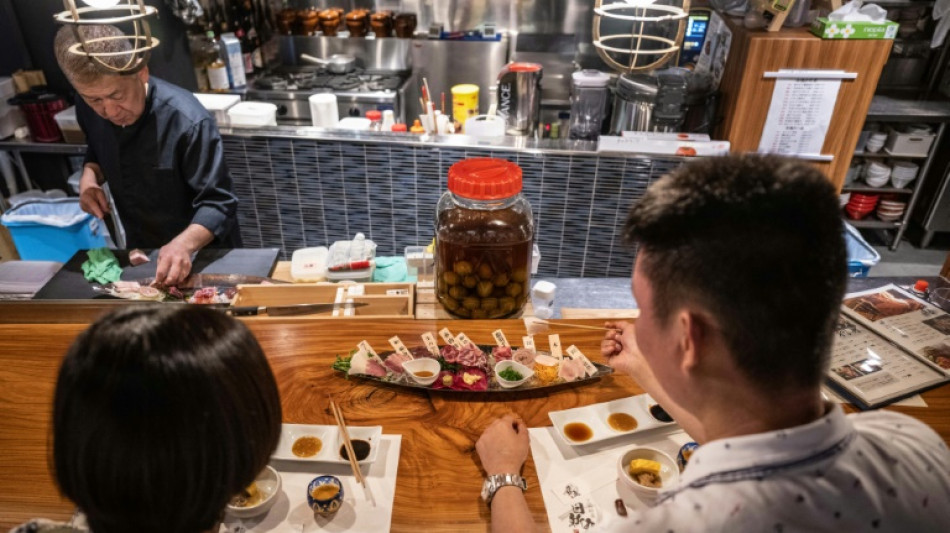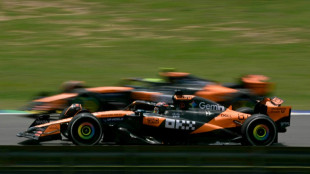
-
 England captain Stokes suffers facial injury after being hit by ball
England captain Stokes suffers facial injury after being hit by ball
-
Italy captain Lamaro amongst trio set for 50th caps against Scotland

-
 Piastri plays down McLaren rivalry with champion Norris
Piastri plays down McLaren rivalry with champion Norris
-
ECB holds interest rates as strong euro causes jitters

-
 Spain, Portugal face floods and chaos after deadly new storm
Spain, Portugal face floods and chaos after deadly new storm
-
EU close to sealing trade deal with Australia

-
 German Cup final to stay in Berlin until 2030
German Cup final to stay in Berlin until 2030
-
What does Iran want from talks with the US?

-
 Taming the lion: Olympians take on Bormio's terrifying Stelvio piste
Taming the lion: Olympians take on Bormio's terrifying Stelvio piste
-
Wind turbine maker Vestas sees record revenue in 2025

-
 Italy's Casse tops second Olympic downhill training
Italy's Casse tops second Olympic downhill training
-
Anti-doping boss 'uncomfortable' with Valieva's coach at Olympics

-
 Bitcoin under $70,000 for first time since Trump's election
Bitcoin under $70,000 for first time since Trump's election
-
'I am sorry,' embattled UK PM tells Epstein victims

-
 England's Brook predicts record 300-plus scores at T20 World Cup
England's Brook predicts record 300-plus scores at T20 World Cup
-
Ukraine, Russia swap prisoners, US says 'work remains' to end war

-
 Wales' Rees-Zammit at full-back for Six Nations return against England
Wales' Rees-Zammit at full-back for Six Nations return against England
-
Sad horses and Draco Malfoy: China's unexpected Lunar New Year trends

-
 Hong Kong students dissolve pro-democracy group under 'severe' pressure
Hong Kong students dissolve pro-democracy group under 'severe' pressure
-
Germany claws back 59 mn euros from Amazon over price controls

-
 Germany claws back 70 mn euros from Amazon over price controls
Germany claws back 70 mn euros from Amazon over price controls
-
VW and Stellantis urge help to keep carmaking in Europe

-
 Stock markets drop amid tech concerns before rate calls
Stock markets drop amid tech concerns before rate calls
-
BBVA posts record profit after failed Sabadell takeover

-
 UN human rights agency in 'survival mode': chief
UN human rights agency in 'survival mode': chief
-
Greenpeace slams fossil fuel sponsors for Winter Olympics

-
 Greenpeace slams fossel fuel sponsors for Winter Olympics
Greenpeace slams fossel fuel sponsors for Winter Olympics
-
Kinghorn, Van der Merwe dropped by Scotland for Six Nations opener

-
 Russia says thwarted smuggling of giant meteorite to UK
Russia says thwarted smuggling of giant meteorite to UK
-
Salt war heats up in ice-glazed Berlin

-
 Liverpool in 'good place' for years to come, says Slot
Liverpool in 'good place' for years to come, says Slot
-
Heathrow still Europe's busiest airport, but Istanbul gaining fast

-
 Highest storm alert lifted in Spain, one woman missing
Highest storm alert lifted in Spain, one woman missing
-
Shell profits climb despite falling oil prices

-
 Pakistan will seek govt nod in potential India T20 finals clash
Pakistan will seek govt nod in potential India T20 finals clash
-
China shuns calls to enter nuclear talks after US-Russia treaty lapses

-
 German factory orders rise at fastest rate in 2 years in December
German factory orders rise at fastest rate in 2 years in December
-
Nigeria president deploys army after new massacre

-
 Ukraine, Russia, US start second day of war talks
Ukraine, Russia, US start second day of war talks
-
Nepal's youth lead the charge in the upcoming election

-
 Sony hikes forecasts even as PlayStation falters
Sony hikes forecasts even as PlayStation falters
-
Rijksmuseum puts the spotlight on Roman poet's epic

-
 Trump fuels EU push to cut cord with US tech
Trump fuels EU push to cut cord with US tech
-
Fearless talent: Five young players to watch at the T20 World Cup

-
 India favourites as T20 World Cup to begin after chaotic build-up
India favourites as T20 World Cup to begin after chaotic build-up
-
Voter swings raise midterm alarm bells for Trump's Republicans

-
 Australia dodges call for arrest of visiting Israel president
Australia dodges call for arrest of visiting Israel president
-
Countries using internet blackouts to boost censorship: Proton

-
 Top US news anchor pleads with kidnappers for mom's life
Top US news anchor pleads with kidnappers for mom's life
-
Thailand's pilot PM on course to keep top job

| CMSC | -0.6% | 23.52 | $ | |
| GSK | 2.35% | 58.62 | $ | |
| RIO | -2.83% | 93.83 | $ | |
| BCC | -0.36% | 89.915 | $ | |
| BCE | -3.54% | 25.43 | $ | |
| NGG | -1.4% | 86.61 | $ | |
| JRI | 1.09% | 13.29 | $ | |
| RBGPF | 5.11% | 86.52 | $ | |
| AZN | 1.16% | 189.85 | $ | |
| BTI | 0.1% | 61.705 | $ | |
| RELX | 3.87% | 30.98 | $ | |
| VOD | -6.56% | 14.743 | $ | |
| BP | -2.34% | 38.3 | $ | |
| RYCEF | -1.87% | 16.62 | $ | |
| SCS | 0.12% | 16.14 | $ | |
| CMSD | -0.13% | 23.869 | $ |

Japan's new whaling mothership sets sail on first hunt
The chef fires up the grill and bastes a chunky whale steak, a Japanese delicacy that could soon appear on more plates nationwide as a new whaling mothership sets sail despite criticism from conservationists.
Fatty raw pink-and-white whale meat is also on the menu at Nisshinmaru, a restaurant named after Japan's previous huge vessel for catching the marine mammals, now retired after three decades at sea.
The last mothership was aggressively pursued in the Antarctic by activists determined to disrupt operations, but Japan has built an even bigger boat to replace it.
The brand-new, nearly 9,300-tonne lead vessel for Japan's whaling flotilla departed Tuesday on its maiden hunt -- heralding a new era for an industry defended by the government as an integral part of Japanese culture.
Called the Kangei Maru, the ship has "an in-house processing facility where the meat is processed before being refrigerated", explained Ryosuke Oba, the restaurant's manager.
"This ship is like a factory. That's its most attractive feature," he told AFP in the city of Shimonoseki, which has a long history of whaling.
Proudly displayed on the wall at the restaurant is a picture of the Nisshin Maru sailing through icy waters with the word "research" painted in bold letters on its side.
Until Japan pulled out of the International Whaling Commission in 2019, it was criticised for exploiting a loophole in the IWC's moratorium on commercial whaling that allows scientific hunts.
Now the nation has resumed commercial whaling in its own waters, making it one of only three countries who do so along with Norway and Iceland.
- Whaling 'identity' -
"Please catch big whales! Please return safely!" said a letter read by small children who danced at a ceremony as the Kangei Maru set off from Shimonoseki on a months-long hunting expedition along Japan's northeastern coast.
The 7.5 billion yen ($48 million) boat plans to catch around 200 whales by the end of the year.
Senior members of the ship's 100-strong crew were handed bouquets as family members said farewells beside the ship with its fresh coat of blue and white paint.
"This is a new ship for a new era, symbolic of the new period of resumed commercial whaling," announced Hideki Tokoro, president of the whaling company that built the Kangei Maru.
Japan hunts minke, Bryde's and sei whales, and wants to expand the list to include fin whales -- the second-largest animal species on the planet after the blue whale.
"Fin whales can weigh up to 70 tonnes. The ship is equipped with a winch able to lift up a whale that big," Tokoro said.
Japan has hunted whales for centuries, and the meat was a key source of protein in the years after World War II.
Even today it is part of school lunches in Shimonoseki, where a gleaming silver statue of a whale tail stands outside city hall.
But in recent decades the country's appetite for whale meat has dwindled sharply, something the city's mayor Shintaro Maeda is determined to change.
"Our biggest goal is to boost demand for whale meat and raise public awareness of it," he told AFP, describing whaling as "part of Japanese people's identity".
- Food security argument -
Kazuhiro Fujino runs a Shimonoseki whale meat shop and has "high hopes" that increased supply, and the possible fin whale catch, will help drive sales.
"These days, Japan relies on imports for everything," he said, so "it's a good idea to catch whales so that we can supply our own food".
But conservationists dispute this argument, saying whales live for a long time and reproduce slowly, so are not a sustainable food source.
Although campaign groups have slammed Japan's plans, little remains of the international fury seen a decade ago when whalers faced clashes with activists in the Antarctic.
"Commercial whaling in the 21st century is unjustifiable. It's an inhumane practice that exists purely for the profit of a few," campaigners World Cetacean Alliance said this month.
Tokoro said it would be "very unlikely" that the Kangei Maru would go to the Antarctic for commercial whaling.
"If we do, it would be when the government orders us to secure a source of protein due to a crisis, due to famine. In that case, we would be ready to go any time."
L.AbuTayeh--SF-PST




